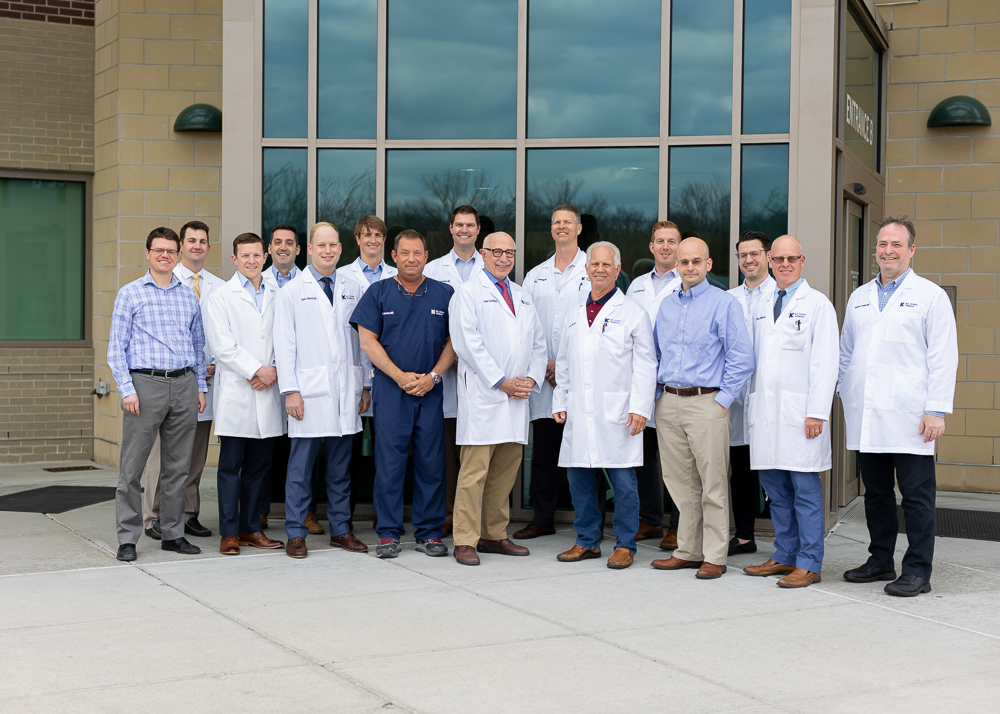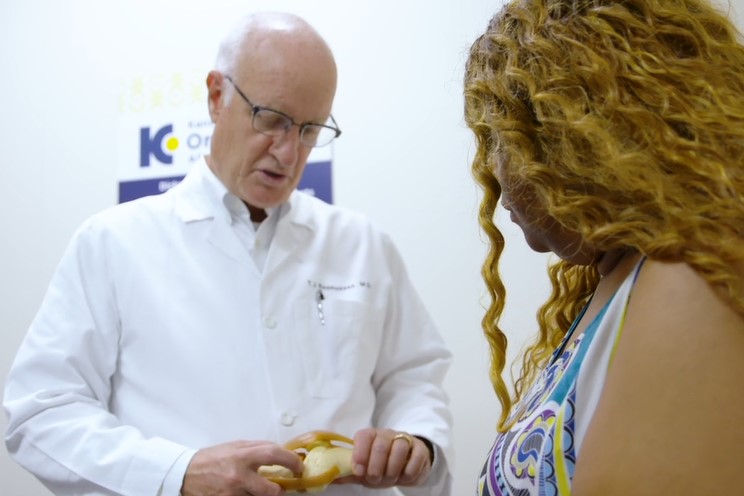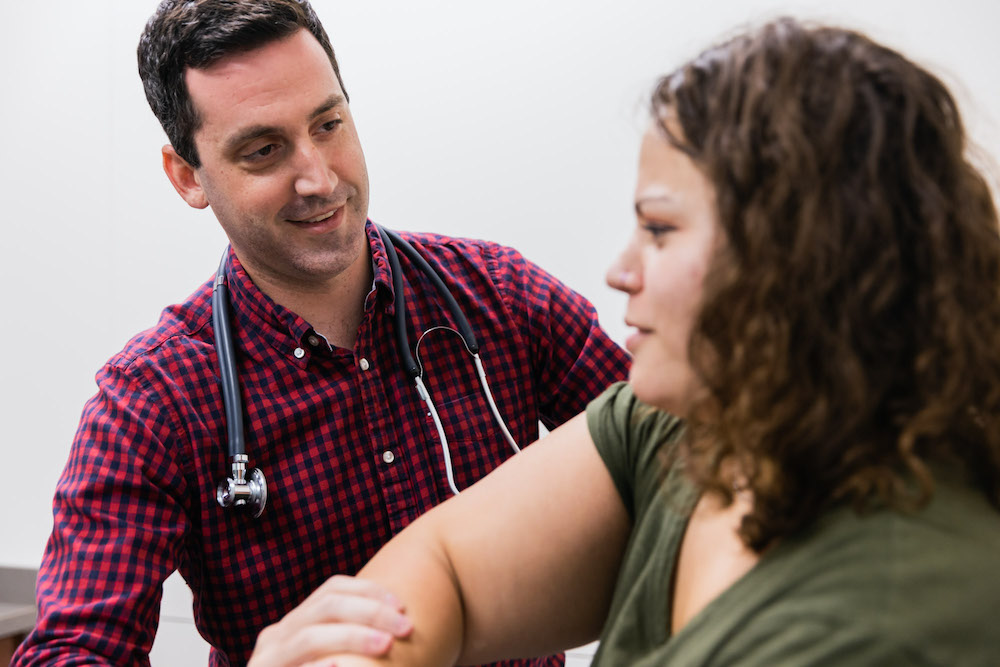
Whether you’re a professional athlete or the parent of a little leaguer, there will likely come a time when you need to seek care for a sports-related injury.
Sports injuries are extremely common, especially among young athletes. Nearly 3.5 million children sustain injuries every year from sports. In order to minimize the time spent on the sidelines, it’s important to seek timely treatment from a qualified sports medicine provider.
However, finding the right doctor to treat your injury can be a lengthy and frustrating process. With so many doctors in the Kansas City area, how do you find one with the qualifications and expertise to treat your injury?
Kansas City Orthopedic Alliance is the Midwest’s premier provider of sports medicine care. As the largest orthopedic practice in Kansas City, we have 5 convenient locations throughout the Metro: Overland Park, Leawood, Belton, Kansas City, and Blue Springs. Our physicians use the latest technology and techniques to evaluate, diagnose, and treat nearly any activity-related injury.
In this blog, our orthopedic experts discuss the steps to finding the best sports medicine doctor in Kansas City. If you’re ready to get started right now, request an appointment with KCOA.
1. Find the right type of provider
Many doctors treat sports-related injuries, so it can be challenging to determine the type of healthcare professional you need. To help you navigate this, let’s discuss the different providers that can treat sports injuries.
Primary care physicians
Primary care doctors (or family care physicians) have general medical training that qualifies them to treat a broad scope of medical conditions. For mild sports-related injuries (like a sprain or a strain), a primary care physician may be comfortable treating your injury.
For moderate to severe sports-related injuries or injuries requiring specialized treatment, a primary care physician will typically refer the patient to a doctor who specializes in sports-related injuries. This can include sports medicine doctors, orthopedic surgeons, and physiatrists.
Orthopedic surgeons
Orthopedic surgeons specialize in treating musculoskeletal conditions of the body. Some orthopedic surgeons specialize in certain areas (hips and knee, shoulder, etc.), whereas others are more generalists.
Although general orthopedic surgeons don’t have advanced training in sports-related injuries, they are qualified to treat many activity-related conditions. If you have an injury that might require surgical intervention, an orthopedic surgeon can help.
Orthopedic sports medicine physicians
Orthopedic sports medicine physicians are orthopedic surgeons with advanced training in the management of sports-related injuries. These providers are uniquely qualified to diagnose and operate on more severe/complex sports injuries.
If your sports injury is causing significant pain or limiting your function, an orthopedic sports medicine doctor can help get you on the road to recovery.
Physiatrists (or PM&R)
Physiatrists (also known as physical medicine and rehabilitation or PM&R doctors) see a variety of non-operative orthopedics and neuro-rehabilitation patients. Some physiatrists have advanced training in sports medicine through a fellowship, while some physiatrists treat more generally.
If you have an injury that does not require surgery but is impacting your function, a physiatrist can offer therapeutic exercise, medication, injections, and other treatments to reduce your pain and improve your function.
2. Look at their credentials and training
After you find the right type of provider to treat your injury, you’ll want to look at their credentials and training. The best sports medicine doctor in Kansas City will have credentials to distinguish them as leaders in their field.
Fellowships
Some doctors complete fellowships in specialty areas, which include sports medicine. After completing their residency, these physicians undergo an additional 1 to 2 years of specialized training in sports medicine. As a result, these providers have advanced knowledge in diagnosing and treating activity-related injuries.
KCOA is proud to have many fellowship-trained physicians on our team. Learn more about our providers.
Board Certification
The American Board of Orthopaedic Surgery (ABOS) offers board certification to surgeons who complete at least 5 years of residency training and pass rigorous ABOS examinations. Not all surgeons are board certified, but as orthopedic specialists, we recommend patients look for surgeons with this certification.
To determine if a surgeon is board certified, you can check their accreditation through the ABOS.
At KCOA, all of our surgeons are board certified or in the process of completing their certification. You can trust that your KCOA surgeon has the advanced knowledge and expertise to perform your procedure.
Certificate of Added Qualification
The American Board of Orthopaedic Surgery offers a subspecialty certification in sports medicine, called the Certificate of Added Qualification (CAQ). To obtain this qualification, surgeons must complete a sports-medicine fellowship, have experience in the field, and pass the CAQ examination.
Surgeons with a CAQ have advanced training and competence in sports medicine within the field of orthopedic surgery.
3. Do your research
When choosing any type of healthcare provider, it’s important to find what other people say about their experience with the doctor and practice as a whole. Reading patient reviews can give you a good understanding of what to expect from your care.
KCOA is proud to earn the trust of sports medicine patients throughout the Midwest. Hear what our patients have to say about our sports medicine doctors in Kansas City!
“This is a great place, I’ve gone there many times for several sports related orthopedic issues and they haven’t failed me yet! Needless to say that I wouldn’t go anywhere else.” -Rick D.
“Dr. Moore was thorough, kind, and allowed me to ask many questions during my visit. She took the time to answer all my questions. I would recommend her to my friends and family with certainty that they would be treated with one of the best.” -H.Z.
“Dr Halloran has done surgery on me and he and his team are outstanding. They took all the time to speak with me and my family members and didn’t rush me out of the office. They have been extremely kind and understand during a very stressful recovery process. In addition, they have treated my family members and have been exceptional with my children whom are athletes. I highly recommend.” -Sara K.
4. Ask for referrals from friends and family
If you are looking for the best sports medicine doctor in Kansas City, sometimes it’s best to ask the people around you. Seek out athletes, parents, primary care physicians, or physical therapists for recommendations on sports medicine providers.
Learning about others’ experiences can give you insight to finding the best sports medicine doctor in Kansas City.
5. Schedule a consultation
Not every provider will be the right fit for you, even if they have outstanding qualifications. You need a provider that will listen to your concerns, wants the best for you, and who you can trust to provide the best treatment. Scheduling a consultation to meet a provider is the best way to determine if they are the right fit.
During your consultation at KCOA, feel free to ask questions to learn more about their skills, qualifications, and experience. As a patient, you deserve the best!
Visit KCOA to Find the Best Sports Medicine Doctor in Kansas City
At Kansas City Orthopedic Alliance, we’re dedicated to creating a superior patient experience for all. If you’re considering orthopedic surgery in Kansas City, our team will work with you to ensure the best possible outcomes. We’ve helped thousands of patients treat their pain, restore their function, and improve their quality of life.
Wherever you are in Kansas City, you’ll find a KCOA clinic nearby. Our providers cover Lee’s Summit, Leawood, Lenexa, Olathe, Johnson County, and more!
For a thorough evaluation, call us at (913) 319-7600 or schedule an appointment today. If you’re struggling with pain but don’t know where to start, use our symptom tracker for treatment recommendations.


